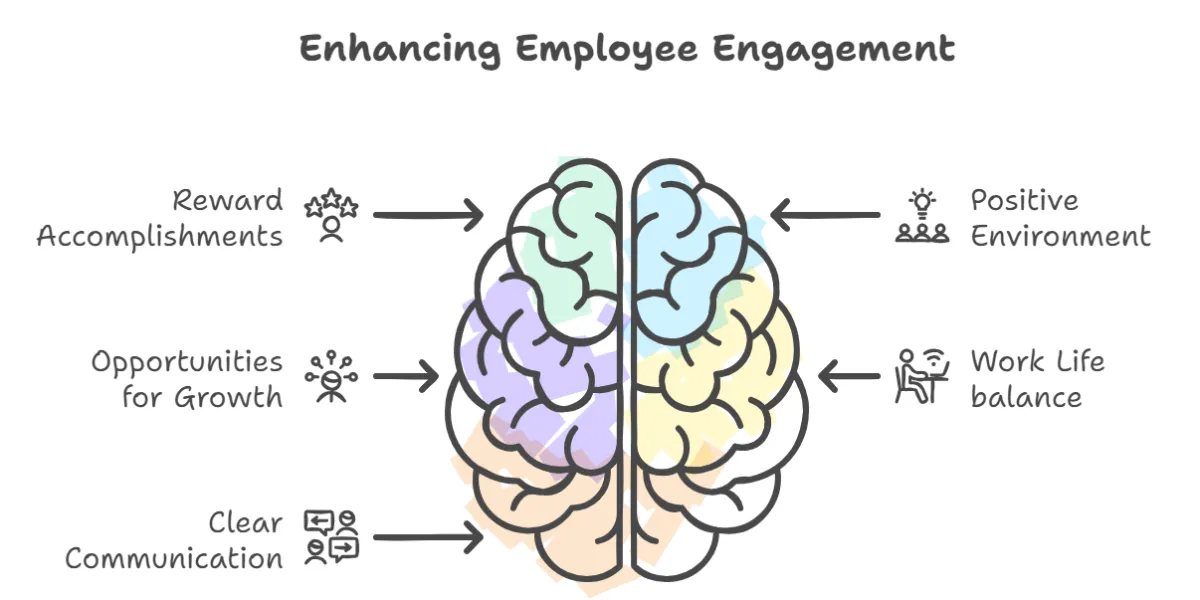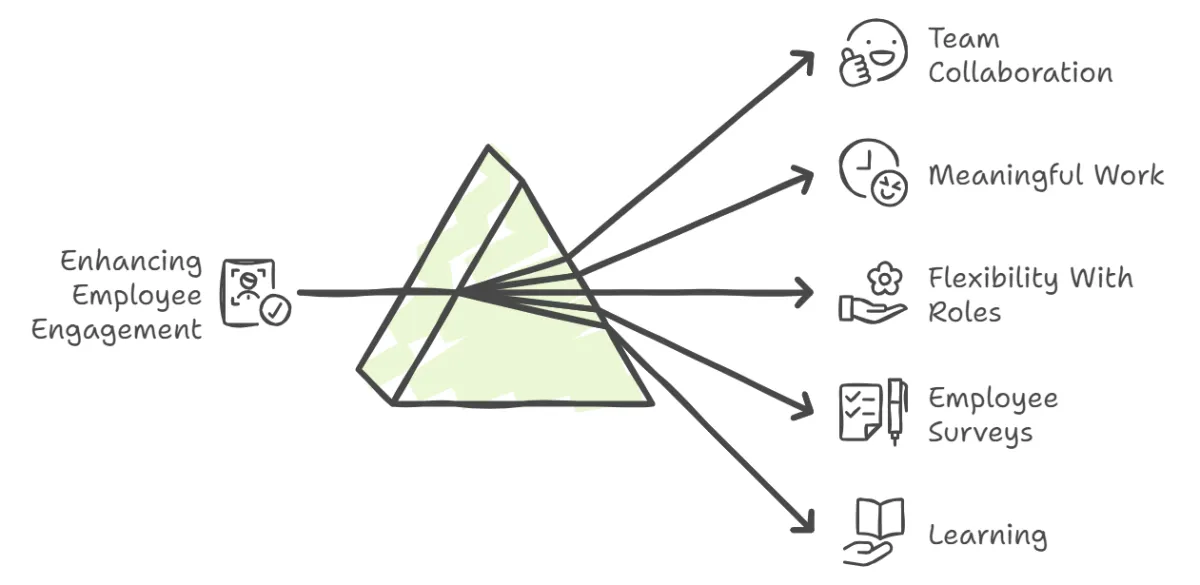10 Ways to Improve Employee Engagement

Employee engagement is more than just keeping employees satisfied—it’s about creating a work environment where people feel valued, motivated, and invested in their roles. For HR professionals, improving engagement is key to building a more productive, positive workplace. Below are ten actionable ways to enhance employee engagement.
1. Offer Clear Communication Channels
Effective communication is fundamental to employee engagement. Ensure employees have access to clear, transparent communication channels where they can ask questions, provide feedback, and receive updates. Tools like Slack or regular team meetings can help streamline communication and make employees feel more connected.
2. Provide Opportunities for Growth
Employees are more likely to be engaged if they see a future within the company. Offer training, mentorship programs, or career development plans to help them grow professionally. Regularly discuss their career goals and provide clear paths for advancement.
3. Recognize and Reward Accomplishments
Recognizing employees for their contributions can have a huge impact on morale and engagement. Implement a recognition program that highlights achievements, whether it’s a simple “thank you,” monthly awards, or financial incentives like bonuses. When employees feel valued, they are more likely to stay engaged.
4. Create a Positive Work Environment
Workplace culture plays a critical role in employee engagement. Foster an inclusive, positive environment by promoting teamwork, respect, and open dialogue. Encourage collaboration and celebrate diversity in your workforce.
5. Encourage Work-Life Balance
Overworked employees are likely to become disengaged over time. Encourage work-life balance by offering flexible working hours, remote work options, or wellness initiatives like mental health days. A balanced life makes for a happier, more engaged workforce.
6. Provide Meaningful Work
Employees want to know that their work matters. Show them how their efforts contribute to the company’s overall success. Make their roles meaningful by aligning individual goals with the company’s objectives and regularly sharing updates on how their work impacts business outcomes.
7. Foster Team Collaboration
Team engagement can drive individual engagement. Create opportunities for collaboration across teams, departments, or even locations. Regular team-building activities, cross-functional projects, or brainstorming sessions can foster a sense of community and shared purpose.
8. Offer Flexibility with Roles
Give employees autonomy by allowing them flexibility within their roles. Allow them to take ownership of projects, contribute new ideas, and find creative solutions. When employees feel empowered to make decisions, their engagement and commitment to their work naturally increase.
9. Conduct Regular Employee Surveys
Understand how your employees feel by conducting regular engagement surveys. This allows you to gather honest feedback on what’s working and what needs improvement. Make sure you act on the feedback you receive—whether it’s addressing concerns or enhancing strengths, employees will appreciate knowing their voices are heard.
10. Encourage Continuous Learning
Learning is an essential part of professional development, and employees who continuously grow their skills are more likely to stay engaged. Offer training sessions, workshops, or even reimbursements for online courses or certifications. Encouraging lifelong learning shows employees you’re invested in their success.
Improving employee engagement requires ongoing effort and a tailored approach based on your team’s specific needs. By implementing these ten strategies, you’ll not only boost engagement but also improve retention, productivity, and the overall workplace culture.
10 Ways to Improve Employee Engagement
Employee engagement is more than just keeping employees satisfied—it’s about creating a work environment where people feel valued, motivated, and invested in their roles. For HR professionals, improving engagement is key to building a more productive, positive workplace. Below are ten actionable ways to enhance employee engagement.

1. Offer Clear Communication Channels
Ensure transparent communication through tools like Slack or regular meetings, so employees feel informed and connected.
2. Provide Opportunities for Growth
Support professional development with training, mentorship, and clear career paths to help employees see their future in the company.
3. Recognize and Reward Accomplishments
Implement a recognition program to celebrate achievements, whether through simple thank-yous or incentives like bonuses.
4. Create a Positive Work Environment
Foster an inclusive culture that encourages teamwork, respect, and open dialogue to boost morale and collaboration.
5. Encourage Work-Life Balance
Promote flexible hours, remote work, or wellness initiatives to prevent burnout and keep employees engaged.

6. Provide Meaningful Work
Align individual roles with company goals, showing employees how their efforts contribute to success.
7. Foster Team Collaboration
Encourage cross-functional projects and team-building activities to create a sense of community and shared purpose.
8. Offer Flexibility with Roles
Empower employees with autonomy, allowing them to take ownership and make decisions, which boosts engagement.
9. Conduct Regular Employee Surveys
Regularly survey employees to gather feedback, and act on it to show that their voices are heard and valued.
10. Encourage Continuous Learning
Offer training or reimbursements for courses to support skill development, showing your investment in their growth.
Improving employee engagement requires ongoing effort and a tailored approach based on your team’s specific needs. By implementing these ten strategies, you’ll not only boost engagement but also improve retention, productivity, and the overall workplace culture.

